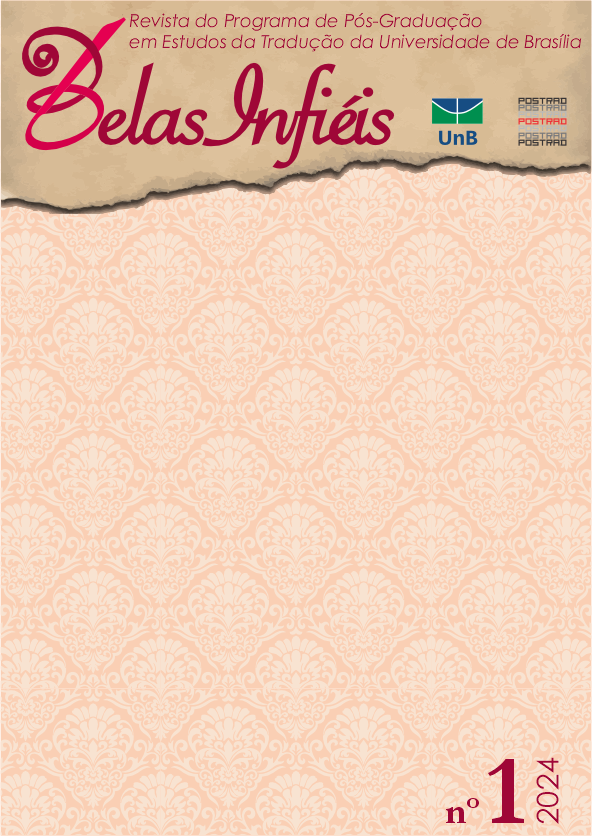Traduzir o écart ou por que não confiar na fidelidade
DOI:
https://doi.org/10.26512/belasinfieis.v13.n1.2024.51291Palabras clave:
Tradução segundo François Jullien. De- e re- categorização. Écart e entre. Assimilar e desassimilar. Tradução e alteridade.Resumen
O filósofo, helenista e sinólogo francês François Jullien desenvolveu um método de sondar algumas das noções chaves do pensamento europeu-ocidental ao adotar uma outra perspectiva para examiná-las, a do pensamento chinês-oriental. Ele propõe uma forma de “de- e re- categorização de um conceito”, ou seja, sem ficar paralisado em nenhum destes dois pontos de vista, mas se libertando de um por meio do outro e assim permitir que se interpretem. É com este exercício que ele aborda a tradução. Ele elabora a sua reflexão sobre o tema valendo-se de certas proposições desenvolvidas e dispersas em várias de suas obras. A questão que o filósofo se coloca é: como a tradução, bem como o próprio pensamento europeu-ocidental pode ser renovado e, até mesmo modificado, ao se traduzir uma língua que não pertence à família linguística do indo-europeu, como o chinês que, além disso, é o único idioma existente atualmente cuja escrita não é fonética, mas ideográfica. Para responder a esta indagação, ele faz estremecer alguns dos constructos base do pensamento helenista que reverberam no que chama de “trabalho da tradução” como as categorias de Aristóteles e Kant, ou ainda, o Ser, Deus, a liberdade, etc. Criticando expressões que usualmente são empregadas no debate acerca da tradução, como “perda”, “traição”, “fidelidade”, “luto”, “diferença”, “equivalência”, “comparáveis”, Jullien ilustra as suas proposições com exemplos práticos de traduções do chinês para o francês e vice-versa. Ele pensa a tradução em termos de écart e entre. Écart é o fenômeno responsável pela abertura de uma distância que faz surgir o entre, o espaço onde o Outro – a língua e culturas de partida – é colocado e mantido em relação. A tradução se opera neste entre aberto pelo écart. Traduzir, segundo Jullien, é, em um primeiro momento, assimilar para, a seguir, desassimilar e, no entre, deixar passar o Outro, sem obliterar a alteridade. Em suma, écart e entre promovem a partilha que é a tradução.
Descargas
Citas
Jullien, F. (2008). De l’universel, de l’uniforme, du commun et du dialogue entre les cultures. Fayard.
Descargas
Publicado
Cómo citar
Número
Sección
Licencia
Derechos de autor 2024 CC BY

Esta obra está bajo una licencia internacional Creative Commons Atribución 4.0.
Copyright Statement
Given the public access to this journal, the texts are free to use but requires the recognition of the original authorship and initial publication in this journal to be properly stated.
The journal allows the use of works published for non-commercial purposes, including the right to submit the work to publicly accessible databases. Published contributions are the sole and exclusive responsibility of the author(s).
- When submitting papers to be evaluated by the Belas Infiéis journal, the author(s):
- Declare that the contents of the contributions are original and of their original creation, being entirely responsible for their content if there is an objection by third parties.
- Claim to be aware that they should not commit academic plagiarism.
- Declare that the manuscript has not been published, completely or partially, in Portuguese or another language. If it is a translation it should be submitted to the Translated Articles section.
- Declare that the manuscript is not being evaluated by other journals.
- Declare that the manuscript was not submitted to another journal simultaneously.
- Commit(s) to inform the journal of any kind of error or inaccuracy in their contribution (published, in evaluation or in editing) and to collaborate with the editors to make due corrections of the article (when in evaluation or editing) or erratum/retraction (after publication).
- Declare that there is no conflict of interest regarding the published work.
- Authorize its release if it is accepted for publication without any kind of monetary compensation.
- Agree to assign non-exclusive rights to publication to the magazine, remaining free to make their contribution available in other media as long as the publication of the first version in Belas Infiéis magazine is mentioned. They also authorize Belas Infiéis to assign their texts for reproduction in content indexers, virtual libraries and similar platforms.
- Maintain copyright and grant the journal the right of first publication, the work being licensed under theCreative Commons Attribution License.
- Is/Are allowed and encouraged to publish and distribute their work online after the editorial process, which may increase the impact and citation of the published work.
- Authorize the editorial team to make textual adjustments and to adapt the article to the publication rules, when necessary.



















